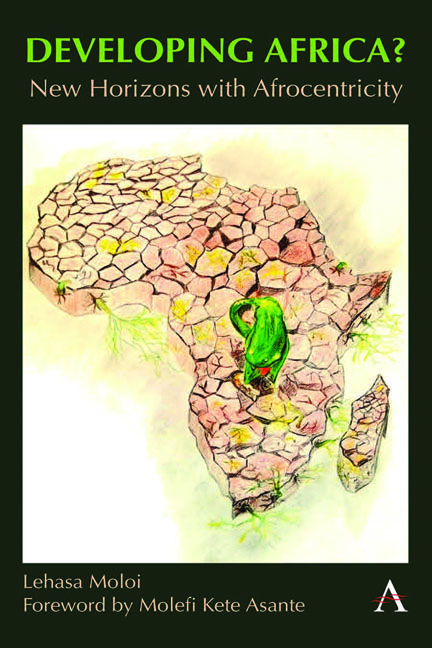Book contents
- Frontmatter
- Contents
- Foreword
- Preface
- Acknowledgements
- Relevance of the Dialogue
- Overview of the Book
- 1 Introduction
- 2 Theoretical Grounding: Afrocentricity’s Approach to Development
- 3 Critique of Eurocentrism and a Mapping of African Development Initiatives
- 4 Afrocentricity on the Significance of African History for Development
- 5 Afrocentricity on the Significance of Culture in the Conceptualization of an African Development Paradigm
- 6 Afrocentricity on the Significance of African Agency in Development in Africa
- Bibliography
- Index
3 - Critique of Eurocentrism and a Mapping of African Development Initiatives
Published online by Cambridge University Press: 13 April 2024
- Frontmatter
- Contents
- Foreword
- Preface
- Acknowledgements
- Relevance of the Dialogue
- Overview of the Book
- 1 Introduction
- 2 Theoretical Grounding: Afrocentricity’s Approach to Development
- 3 Critique of Eurocentrism and a Mapping of African Development Initiatives
- 4 Afrocentricity on the Significance of African History for Development
- 5 Afrocentricity on the Significance of Culture in the Conceptualization of an African Development Paradigm
- 6 Afrocentricity on the Significance of African Agency in Development in Africa
- Bibliography
- Index
Summary
For Africa as a continent and its people to experience freedom from Western intellectual bondage, the conceptual framing of African development discourse(s) must be re-grounded within African knowledge systems, values, history and culture, through African agency. Such a shift in thinking will enable Africans to participate actively in shaping their own development as agents, rather than merely existing as objects of the European development story. The colonization of Africa by Europeans has framed Africans as people without any history or knowledge of their own to improve the quality of their own lives. As I have already shown, this view of Africans, held by many European scholars, was used to justify the colonization of both Africa as a continent and its people. As a result, Africa's future development was also placed in the hands of Europeans, who were presented as a perfect model of how development was imagined. Anything that seemed to differ from this view was regarded as a form of backwardness. The idea and practice of development in Africa after World War II (from 1945 onwards) was a continuation of the same colonial pattern of undermining African people's capacity to solve their challenges.
Eurocentrism in Development Studies: From Modernization to Neoliberalism
The fundamental challenge facing Development Studies is how the subject can transcend the limitations created by Western epistemology and open the path for alternative development visions. According to Pieterse, Eurocentrism as a guiding intellectual paradigm has long served the agenda of imperial management of societies labelled part of the ‘Third World’. In this regard, Ndlovu-Gatsheni raises the following fundamental question: ‘What does development mean for a people struggling to emerge and free themselves from the inimical legacies of enslavement, colonialism, imperialism, apartheid, neocolonialism, underdevelopment as well as the imposition of the Washington Consensus and neoliberalism?’ In this context, it is important to interrogate the epistemological foundation that informs the nature and structure of development as a discourse in the Global South, and in Africa in particular. The main challenge facing Development Studies in Africa has been the fact that it is a derivative of Western epistemologies and that it is informed by Western experiences and a Western agenda. Therefore, African scholars face the challenge of decolonizing development theory itself to enable contextual relevance.
- Type
- Chapter
- Information
- Developing Africa?New Horizons with Afrocentricity, pp. 43 - 64Publisher: Anthem PressPrint publication year: 2024

